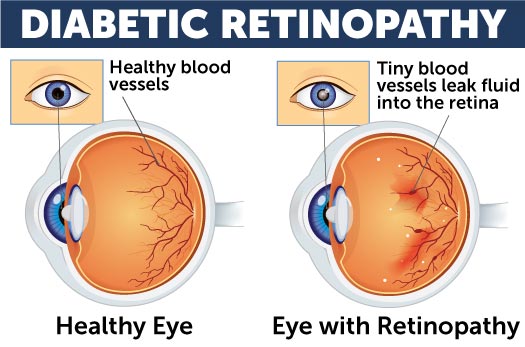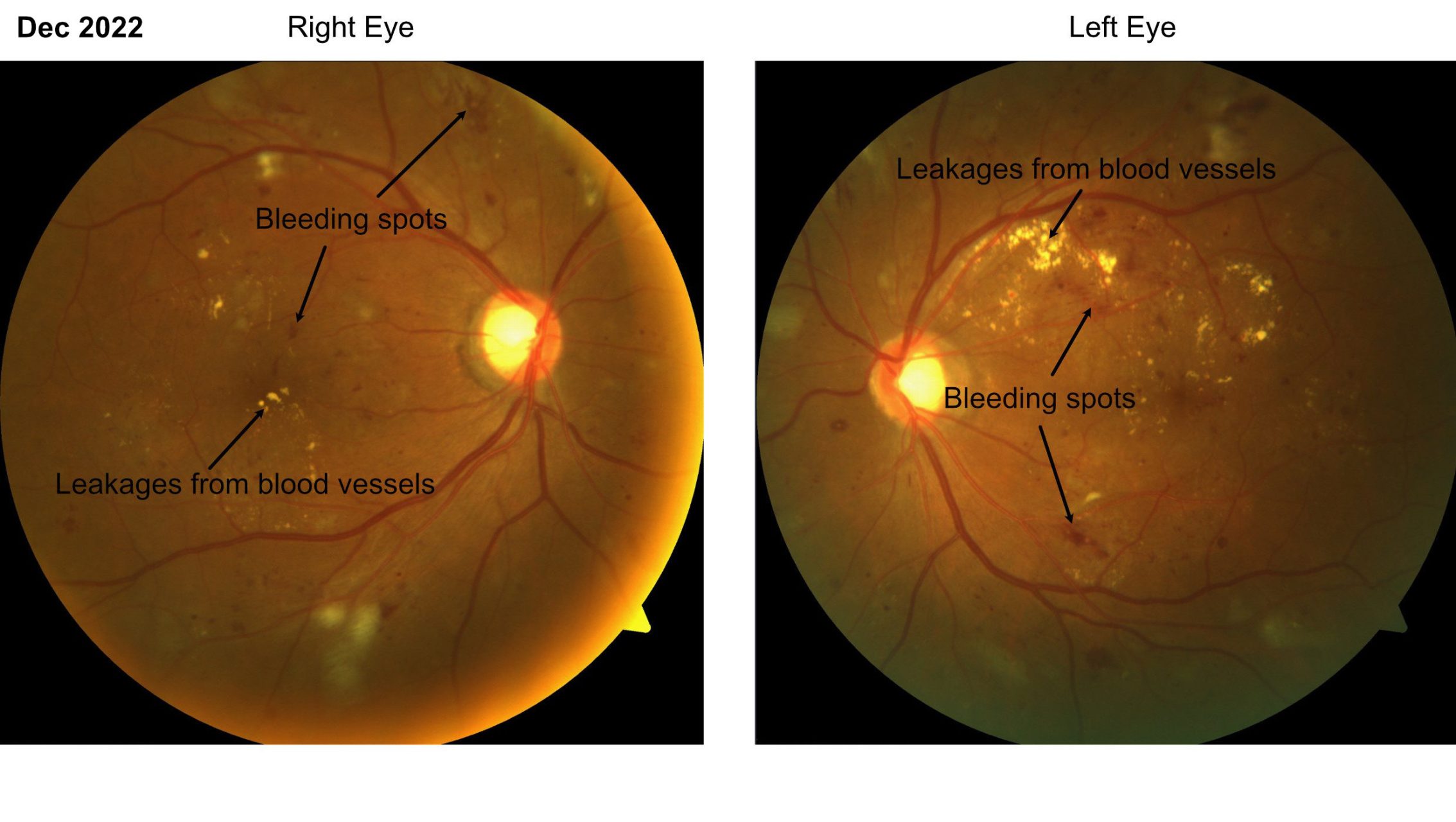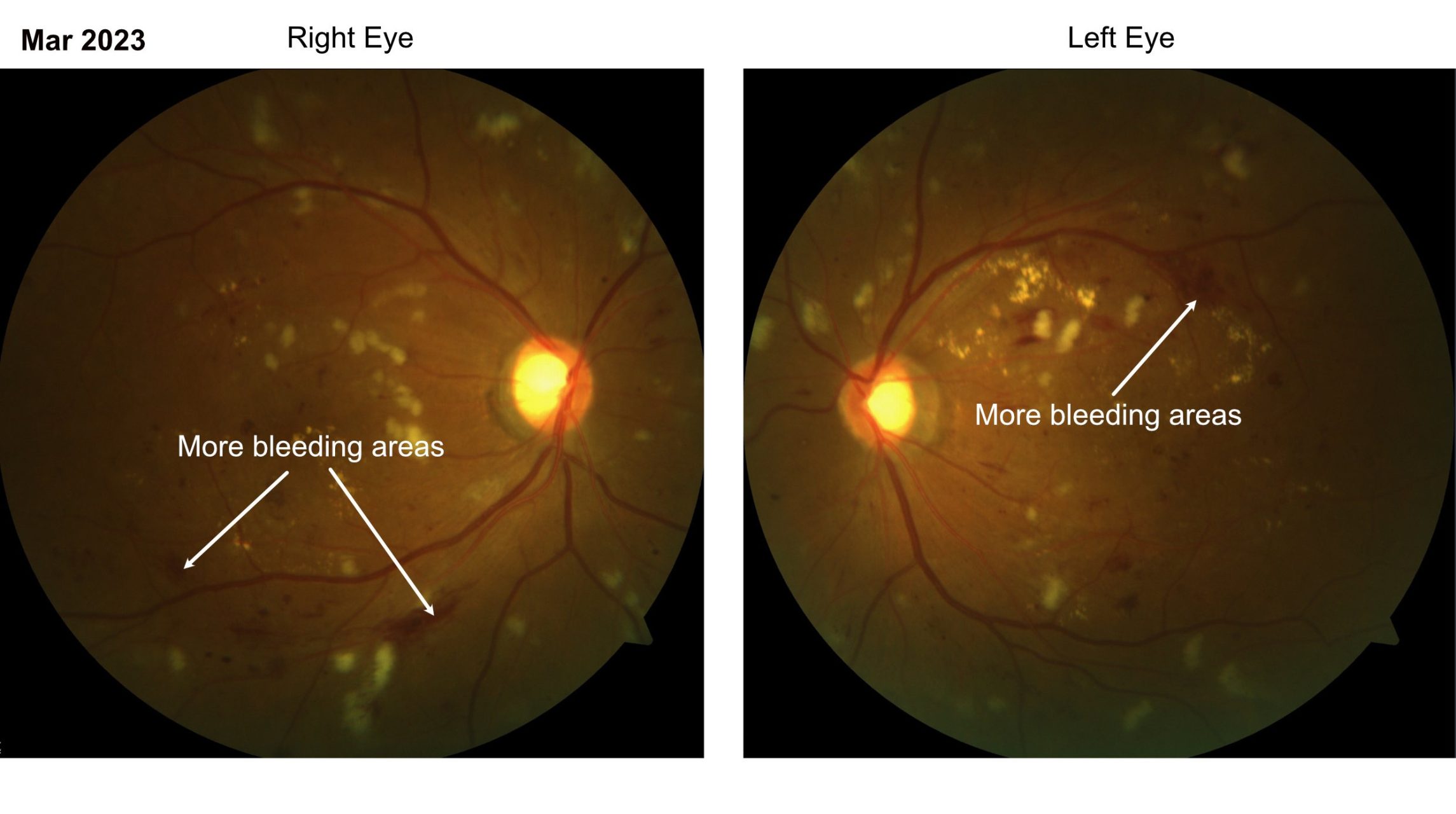In Singapore, the prevalence of diabetes mellitus for citizens and permanent residents aged 18–69 years increased from 8.3% in 2010 to 8.6% in 2017, and the International Diabetes Federation estimates a DM prevalence of 13.7% for the entire adult population of Singapore by 2030.
Among those diagnosed with diabetes / aware of their disease, 1 in 3 have poor control of their condition, which increases the risk for serious complications which includes Diabetic Retinopathy.
Diabetic Retinopathy
Diabetic retinopathy is an eye condition that can cause vision loss and blindness in people who have diabetes. It affects blood vessels in the retina (the light-sensitive layer of tissue in the back of your eye).
Risks of Diabetic Retinopathy
Diabetic patients who do not control their blood sugar level or have diabetes for more than 5 years are at higher risk of getting diabetic retinopathy
Studies revealed that:
- Intensive blood sugar control in newly diagnosed patients with Type 2 diabetes had less complications, including diabetic retinopathy
- Approximately 25% of Type 1 patients have some retinopathy after five years
Signs and Symptoms
Diabetic Retinopathy is a complication of Diabetes. When the high blood sugar damages the blood vessels in the retina, the damaged blood vessels can swell and leak which may cause you to experience:
- Blurry vision (Most common)
- Dark areas in your vision
- Vision loss
- Distorted images / words
This picture below shows in a healthy eye, there are no leakages, while in a eye with Diabetic Retinopathy, there are leakages and bleedings.
We often see diabetic retinopathy in our practice, and this case, which we are about to show, is the most severe case that we have encountered.
In Dec 2022, we saw a 50 year old male patient who came in to make a pair of glasses as he had been experiencing blurry vision for distance on both eyes. After a comprehensive eye check with Fundus Photography done, we found that his vision on both eyes were poor and could not be further improved. The fundus photograph showed that there are bleeding areas on the back of his eyes.
We suspected that he has diabetic retinopathy. He did not have a health check for 10 years. Hence, we recommended him to make a new pair of glasses later and visit an eye specialist and GP first.
However, he insisted on making a new pair of glasses and did not want to see an eye specialist and GP to check on his blood sugar level.
3 months later in Mar 2023, he came back to us to make another pair of glasses. Through a conversation with him, we realised that he was admitted into the A&E, diagnosed with diabetes and is currently under medications. He also mentioned that ever since Dec 2022, his vision had been deteriorating and he has yet to see an eye specialist.
Our optometrist conducted another comprehensive eye check for him. Indeed, his vision had worsened since Dec 2022 and despite his prescription increasing, his vision could not be further improved. From the fundus photograph, we could tell that there were more bleedings on the back of his eyes and his diabetic retinopathy had worsened which then affected his vision.
The 2 sets of pictures shown below are a comparison of his fundus photography taken using ZEISS Visucam.
We wrote a referral letter and referred him to an eye specialist for a dilated fundus examination and other necessary tests. Thankfully, this time, he went and had treatment for his diabetic retinopathy.
If he had seen the eye specialist / GP earlier in Dec 2022, further damage to his eye health and vision could be prevented.
Importance of regular eye exams if you have diabetes
Regular eye exams for diabetic patients include dilated fundus examination and OCT scan. Dilated fundus exam is done by instilling eyedrops into your eyes to dilated your pupils to allow the eye specialist to assess the health of your retina with a better view. OCT scan is taking a scan of the back of your eyes to see if there are any swollen areas.
At the initial stage of diabetic retinopathy, you may feel asymptomatic or have little symptoms. Having regular eye exams allows diabetic retinopathy to be detected early and early treatment can be done to prevent further damage and blindness.
How to reduce risk of vision loss from diabetes
- Keep your blood sugar level under control is very important
- Ensure you see an eye specialist for eye exam especially dilated eye examination regularly
At Evershine Optical, we provide a comprehensive eye exam which includes assessing the health of the front and back part of your eyes and taking fundus photographs. With fundus photography, we are able to show you the health of the back of your eyes and even do a comparison the next time you come back for an eye exam.
Contact us at 88461234 for an appointment today !
References
- Diabetic Retinopathy by the Numbers. 2016. Review of Optometry.
- The Singapore demographics of Diabetes. 2022. DIABETES SINGAPORE.
- Trends in diabetes-related complications in Singapore, 2013–2020: A registry-based study. 2022. National Library of Medicine.




